Backworlds update
I have been neglecting this space for a while – nothing about GDC, E3, SGDQ, SDCC or any of the games I have played this year – while it was always intended to be a casual affair, I do dislike it when blogs unceremoniously stop getting new posts. There are a few reasons for why this happened, but the most important one is that I have been working to complete and polish Backworlds. Today, we announced that we’ll be a part of the Indie Megabooth at PAX West, as well as demo at GamesCom and EGX. We also unveiled this fancy new trailer:
I tend not to talk about Backworlds on my own channels since it has a social media presence by itself, but I would guess the two will blend a bit for the upcoming months. It has been almost 9 years since we started experimenting with this concept and we have lost and found our way more than once, more on that in a later post but for now I’m happy to say that we’re close to the finish line. We are pretty proud of the game we have made, so check it out =)
Sundered
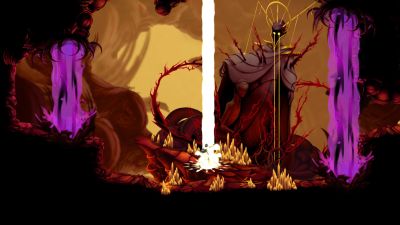
Sundered is Jotun developer Thunder Lotus’ take on the Metroidvania genre – one heavily influenced by Rogue Legacy with large chunks of randomly generated passages and a hub you visit for permanent upgrades everytime you die. Much like Jotun it is a very pretty game, and as a big appreciator of the genre the high production values of sundered make it into a competent game.
Unfortunately, it feels like the changes Sundered brings to the Metroidvania formula does not really serve to make the game better. The randomized levels means backtracking is a chore as you have to re-explore a similar set of rooms every time you die and there are no smaller secrets or especially interesting challenges to provide something to look forward to. The upgrade system does make sure you consistently get stronger even in failure, but it also gives you a trickling power increase that doesn’t require any real effort and doesn’t provide any interesting choices or changes to the gameplay.
Finally, contributing to the blandness of the levels, the enemies are not manually placed to create interesting encounters but randomly spawns and comes after you – occasionally in large waves. There is little finesse to each enemy, instead the game relies entirely on overwhelming the player with cheap tactics – enemies can spawn and shoot at you from several screens away and can ignore level geometry. It does create some fighting that at least looks intense, but frequently the game will put you in fields that damage you over time and put obstructions in your way out while covering the screen in effects making it impossible to see where the player character is. Late-game areas have instant-death pits that require minutes of backtracking to get back to, and thanks to the randomness of the game an impossible situation might be trivial the next run making it feel like whatever you learned from the first time didn’t matter.
Now, there’s an appeal to button-mashing horde combat and maybe you enjoy that more than traditional Metroidvania fighting. Even as a fan I can admit that games in the genre typically get very similar, and if you are bothered by this or just feel that rougelites are more interesting then Sundered might be a good choice. It is a game with high production values and much like Jotun the boss fights are mostly interesting, so I can’t say I regret playing it, but it feels to me like an ambitious and ultimately failed experiment.
… On a personal note, I didn’t write anything for new years – no particular reason other than that I was busy, and I had already spent all of December talking on facebook about my favorite 2017 games. For the record, Hollow Knight was my top choice though I spent the most time with Destiny 2.
Destiny 2
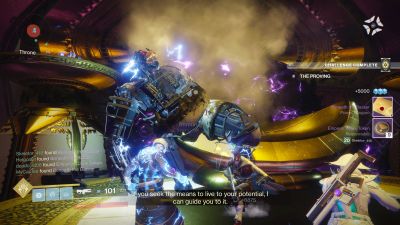
The first Destiny was my introduction to a lot of things about dedicated gaming – never before had I done high-level endgame content or a raid, interacted with weekly lockouts or put much thought into acquiring gear past the credits roll or actually played PvP to any meaningful extent. I work for a company that values the community and has done so long before games as a service was a thing, but Destiny was the first time I intensely followed strategies, uncovered secrets and – yes – abuse from the players. I went into Destiny 2 as a dedicated player and it has been my ticket into experiencing new things, the race to uncover secrets just after release and the thrill of going into a raid blind. I spent a lot of time in Destiny one and compared to a similar time three years ago, even more time in Destiny 2.
A lot of people have asked me about the experience, and I always tell them I’m not qualified to answer. My perspective is colored by thousands of hours worth of familiarity, and if you are one of the persons that have been holding out for the PC release tomorrow then my opinion is not going to give you meaningful insight. There are small things anyone can tell you – the second-to-second is a masterclass in FPS gameplay. The environment art is stunning and evocative. The game is better at telling you what to do and why you’re doing it than its predecessor was, but it still has a lot of its rules and mechanics obfuscated. Beyond those things, my opinions are those of someone in too deep, but luckily I don’t have to have any concerns about swaying anyone here.
Destiny 2 has a fundamentally different focus than Destiny. I used to think of it as rewarding skill rather than time investment as the gear and levels you acquire matter little in regards to how easy the endgame is to tackle, but on the other hand most of the endgame only gives you cosmetic rewards in the first place so that doesn’t seem fair either. Someone mentioned that it is lacking in incentive rather than content which is an argument I can understand, but it is also assuming a grind model from the first game that is just not there in Destiny 2. Yes, there is no real incentive to do the endgame content since the gear you will get from it will not make the endgame itself easier than gear you get from elsewhere, but on the other hand the idea that you’re running the raid solely to make it easier to run the raid seems a bit simplistic. Destiny 2 takes a different approach in its loot system and after having gotten most every piece of gear it has to offer I can’t say I would have wanted it to be different.
Part of me wanted the record books, the hunt for grimoire and the forty times I ran Winter’s Run to get that perfect roll for Stolen Will, but I also know that it was mostly just a measure of the time I put into it and the goals it had laid out for me didn’t serve to make the game deeper. Even as I find myself missing the things I had to do in Destiny, I remember all the other games I passed on during its first and second years and think that if Destiny 2 failed to deliver a robust endgame, it did so because it dared to be more responsible with the challenges it offered.
There are things I wish had been done differently, to be sure. The new PvP does not agree with me, and I preferred the more traditionally FPS-inclined Wrath of the Machine to the super mechanics-oriented King’s Fall and Leviathan. While I understand that the crazy weapons and offshoot subclass abilities were causing design problems, the game feels less interesting with them removed and everything turned down to an acceptable level of power. But I played Destiny 2 because I liked it an not out of habit, and it is an improvement over the first Destiny both in ways I love and in ways I feel hesitant about but I know is ultimately for the better.
Indiecade 2017
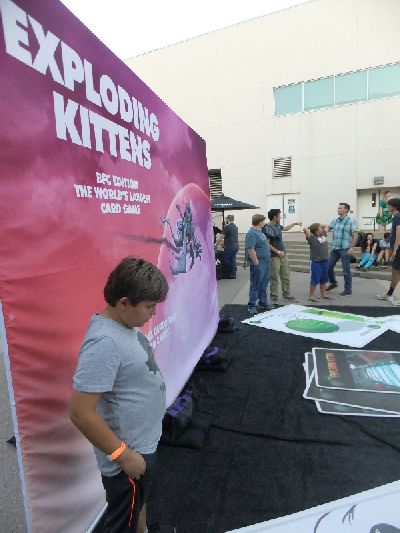
Indiecade moved again this year to Little Tokyo – The open areas and exhibition halls of the Japanese American National Museum are certainly well suited for the type of event it is and with the proximity to restaurants and shops it was a big improvement over last year in terms of space. Perhaps not quite as good as it was back in Culver City, but more suitable than UCLA for sure.
Another change was the notable absence of Sony, Nintendo and Microsoft – I don’t know how much this was a desire from the festival organizers to go further into their niche and how much was the console manufacturers pulling out, but their presence always brought with it a series of more traditional independent games that served to ground the festival in something a little bit more accessible. This was perhaps not strictly necessary for a festival that has always strived to highlight the innovative and esoteric, but Indiecade does feel a lot smaller without them and it was hard to find enough things to do to spend more than a couple of hours there.
That said, Indiecade is always a good time and this year had some of the past year’s really strong titles on display – notably OneShot and Dream Daddy from my own favorites – and I was delighted by Penny Blue Finds a Clue. I also had the chance to meet an old friend who had the more traditional game Yoku’s Island Express on display, a gorgeous game with an interesting twist on the exploration-platforming genre.
Ghost 1.0
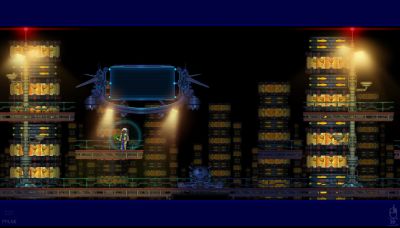
Ghost 1.0 is a game that combines twinstick shooting with exploration platforming and although it takes a little while to wrap your head around the controls, it feels really empowering when you get it. There are plenty of dangerous things with dangerous weapons in the game, but you always feel empowered to avoid projectiles and fire back without the game ever taking the skill out of either, which is no mean feat. So while the difficulty curve is sometimes uneven, the game mostly gets the moment-to-moment gameplay down really well.
As for the larger scope, it is set up as a roguelite platformer with light exploration elements and heavy loadout/progression options. It offers you the choice to play it as a more forgiving platformer but it’s hard to say what the intent was – if you keep your items you soon have more weapons and upgrades than you can keep track of, and if you decide to go the survivalist route it’s not very good at giving you a chance to get back in the game. It also has massive amounts of different upgrades which is a bit of a shame since there’s not a lot of opportunity to experiment and the time could possibly have been better spent making the areas look more interesting.
There’s something goofy about Ghost 1.0 hinting that it is exactly what the creator intended it to be, a tone that draws more from 90s cartoons for preteens than any of the games that inspired it. Rather than attempting to set a somber and desolate mood like the games that inspired it, it gleefully accepts that its story and design is something of a fanwork – rather than a game where every element is placed with intent it flows over with content both good and bad. It’s hard to fault it for being a passion project, but at the same time it feels a bit like a lost opportunity.
Also, since I played a bunch of games since the steam sale…
One Dog Story is another platformer that feels like a passion project more than the work of an experienced hand, it has some interesting encounters in it but a lot of arbitrary difficulty spikes, odd mechanics and general bugs.
Ovivo is a simplistic and stylish take on a concept that’s not entirely original. It doesn’t really bring anything new to the table, but it plays well enough and looks good enough that it is well worth the time it takes to complete.
Albert & Otto feels like it wants to be Limbo with more action gameplay, it has some pretty neat puzzle elements in there but leans heavily on physics that are unpredictable and telegraphs that do not give you enough information.
Abzu is, seemingly intentionally, Journey with a little bit more gameplay. I’m not entirely sure the collectibles really add anything as Journey was a very pure experience, but it’s high bar to reach for and Abzu is still a great experience.
Event[0] uses its pieces masterfully to set an unnerving mood – the text recognition is by no means perfect, but it is just good enough to deliver something better than your average scripted conversation.
Out there Somewhere is a short platformer including equal parts camp, early 90s PC platformers and some Knytt. It is a small game, lasting less than two hours for a single playthrough, but a game that delivers the full experience of its gimmick without overstaying its welcome.
Finding Teddy has some really nice color palettes and environments, and some really neat puzzles to unravel but can sometimes take its inspiration of old-school adventure games too far in the obscurity of its puzzles.
Monsters ate my Birthday Cake I backed the kickstarter to this way back in the day and never got around to playing it, but it is a surprisingly solid puzzle game.
Snakebird starts of difficult and then raises the bar. Reminds me of Jelly’s Puzzle in that the rules are clear and simple but solutions are still very tricky.
Prey
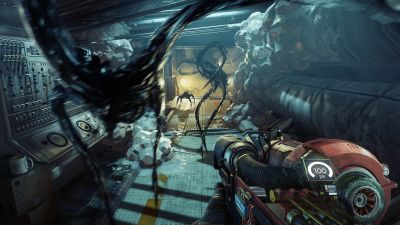
There is a neatness to Prey that is really impressive. The opening is a masterpiece in itself, immediately drawing you into the rude awakening and throws you the first surprise just after the short opening. Plenty of games have used amnesia and in medias res for openings, and Prey did hint about it in the trailers, but it does not dwell on it. Rather than dwell on the mysteries of what happened, Prey reveals what happened fairly quickly and makes the quest all about figuring out why. I’m not usually swayed by moral ambiguity in videogame stories, but Prey delivers just enough background to keep it interesting without revealing so much that the answers become obvious. Whatever shortcomings the game has otherwise, the story will happily compensate for.
Not that there’s a lot of shortcomings, mind. Prey controls well, gives you a reasonable amount of freedom in choosing your own path and rewards caution and attentiveness. If anything, the game contains remarkably little actual character progression for a game with so much exploration, the lack of resources make sure even early game enemies never stop being an annoyance and the constant respawning makes backtracking an adventure in itself. It feels like an intended nod to System Shock, but it makes exploration tedious and since the game is always very clear on what will advance the story it almost feels like it is punishing you for being thorough.
Still, it’s not that Prey ever gets bad, only occasionally slightly repetitive. And that can itself be chalked up to ludonarrative dissonance at worst. Prey really is a neat game.
Legend of Heroes: Trails in the Sky the 3rd
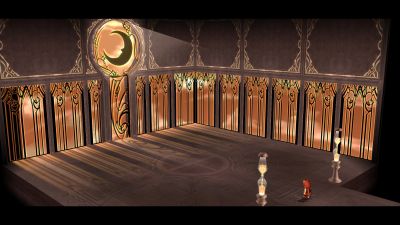
Trails 3 feels like fanservice – a way to expand on the stories and backstories of the characters in the first two chapters without having to produce too much new content or influence the world in any significant way. Gameplay-wise it is about as good as the previous games – functional, but not deep or innovative – and it offers a good slew of long flashbacks that are essentially hour-long cutscenes that do nothing but give you exposition on the character backgrounds. Building a game that’s specifically targeted only to the big fans of the previous games is a bit of a gamble though, so it’s nice to see them catering to their community at least.
One interesting part is that while the story doesn’t take center stage, it is in many ways a better story than the first couple of games offered. The main character Kevin has many more things going on than most of the other cast combined, and even though the game is about him overcoming his internal struggles he never comes off as a weak or unlikable character before working through them. It is an uncharacteristically human portrayal that shows that even characters that seem to have it together can have inner demons, and even though there are a bit too much magical mystery in his background story for it to become intriguing the resolution leads to more subtle and mature changes in his manners. It could well have been a bigger part of the game, but on the other hand it is difficult to say if it had worked as well had it been fleshed out more.
I have grown somewhat fond of the Trails series at this point, but after spending 130+ hours in the games it is difficult to tell how much of that is due to quality and how much is Stockholm syndrome. The series starts out with a cast of characters that are mostly comic relief goons or tortured loners with a dark past, but fleshes them all out during the game – I don’t know if this makes them better characters or if I’ve just gotten used to them. There is something to be said for knowing your form, and if you know the reader or player is going to be engaged for a considerable amount of time you can allow yourself to have characters that are initially unlikable – I think there are games that take advantage of this better than the Trails series, but if anything Trails in the Sky 3 shows that banking on familiarity is not necessarily a bad thing.
NieR: Automata
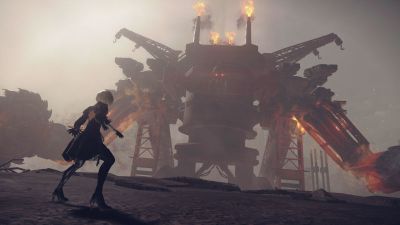
Deliberately breaking the fourth wall and integrating the tropes and support mechanics of games is becoming so common these days that there’s plenty of material to compare just that element to. OneShot was built around the concept and executed it remarkably well. Undertale used it for narrative purposes but left the game mechanics of its JRPG – bullet hell – hybrid more or less intact. To be fair, NieR Automata seems to mostly use the same system as the original NieR which came out before those games, but it still feels like it detracts more than it adds. To its credit, NieR’s handling of the fourth-wall-breaking moment doesn’t detract from its story (like I would argue is the case with Metal Gear Solid), but it also doesn’t add so much that it excuses the inconvenience added. In short, NieR does not autosave but includes a Dark Souls-like system where death simply means you need to retreive your body – they then remove this system as a plot device and suddenly you’re punished for not saving manually.
That’s not all there is to NieR, though, and the game it is based on is a very enjoyable action romp that switches between 3D movement, top-down arena shooting and sidescrolling action – it is mostly seamless, but ultimately does not add a lot. The action is solid and the dodge and combo mechanics together with the wide variety of customization options keep every fight interesting. You can cheese a lot of encounters by keeping a safe distance and shooting, but mixing different approaches is a much faster approach and the game includes enough challenges where speed is of the essence to keep it varied. In terms of the larger scope of the game, it contains your garden variety sandbox quests and is slightly too much on the filler side of content, but at least the game doesn’t really prod you to complete things and the exposition you get from doing it is usually interesting.
On the topic of narrative, NieR Automata has plenty of twists and it walks a fine line between not being too obvious about them (at least not all of them) but still have them make sense – this is extra impressive considering it ties into the established lore of the previous games and I managed to pick up on that without playing them. It also has overly earnest anime characters that fall apart in theatrical ways, tolerance of that seems to be highly personal but it ruined a lot of it for me. Overall, the thing the game most suffers for is being open – there are a lot of invisible walls and really shaky platforming involved – but there is a solid action game there with an interesting story.
Also, Sunset – it was released more than two years ago now, but I am lazy.
I feel like Tale of Tales bit off just a little bit more than they could chew with this game – the concept is neat and the way the communication progresses between the two main characters is unique, but a lot of the story and player agency gets lost due to the restrictive mechanics obfuscating what is actually going on in the world outside and what choices you are actually making. The game barely uses the time limit so I feel like ditching that and adding more explanation to some of the critical steps would be an improvement, but the limited interactions and presentation make it hard to sell the story and some pretty glaring visual and continuity bugs take you out of the experience.
Despite this, Sunset is a pretty neat walking simulator, but it feels like it should have been better.
E3 2017
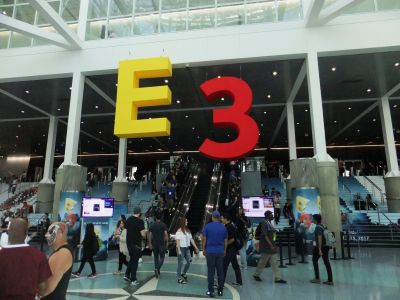
Kind of late to the party, admittedly, as E3 was more than a week ago now. I’m not really interested in publicly musing about the announcements themselves – all of them are online for anyone to see and make up their own mind about.
The show itself has always been a weird thing – a joint press event for the gaming media from before when the individual publishers had enough pull to get any attention, it fell off the map when the publishers did get big enough to put on their own shows. It then came back, and it’s never been entirely clear why – it seems some big actors agreed with this and simply neglected to have any E3 presence whatsoever. Last year had EA drop out and hold their own event open to their fans, this left the show floors fairly empty and in 2017 E3 was opened to the public. To be fair, it was kind of always open to the public if you had a thousand dollars and could be bothered to set up a blog, but this year the pretense was dropped and the price was dropped to something more akin to what you’d pay to attend a convention.
That said, I like E3. For all of its superficial glamour and questionable marketing practices, it was always a good time to walk around and get some hands-on time with the upcoming selection of games. It was something of a limited preview and I never understood why I got invited in the first place – to some extent neither did others, and a lot of E3 remains hidden behind closed doors, available only to the media. It used to be that even if the bigger games had long lines if you wanted to try, there were always free stations for some of the less highly publicized stuff you could try at any time. Not so this year, as the amount of people guaranteed that no game could be played if you weren’t prepared to wait for an hour.
So I kind of miss what E3 was, but I know full well it made no sense for it to remain exclusive.
Mass Effect Andromeda
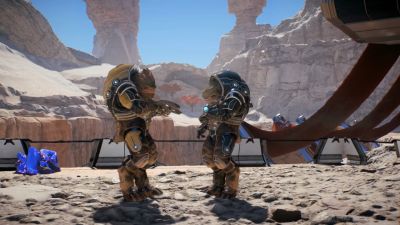
With so many games adopting sandbox qualities, figuring out just what parts of a game to actually experience becomes a skill in itself. In the ideal case the core gameplay is so good that even completing mundane tasks is rewarding for a very long time, but it is starting to seem like there is an increasingly long tail of content where developer resources are diminishing as the potential players do. Horizon balanced this very well with a good number of side content that was done before you got tired of outsmarting robot dinosaurs. Mass Effect Andromeda has a little too many things going on for its own good.
Mass Effect has always been light on the main story and heavy on the optional content, but it feels like the line between the high-tier content intended for everyone to play through and the things specifically for the completionists is getting blurred. It is still fundamentally a roleplaying game and it will pester you to do favors for everyone you meet – as most of the smaller sidequests involve hopping back and forth between planets and occasionally shooting some cannon fodder, it becomes boring pretty quickly.
Still, Mass Effect is helpful enough to sort the quests you receive roughly into categories of production quality so you can skip out on the less enticing content, and like the previous games it is light enough on punishment that you are encouraged to live with your decisions rather than load an earlier save and try to optimize your route. And the main quest manages to feel like a fresh direction for Mass Effect that goes to really interesting places.
There’s a really great game in there, but there’s also a lot of decent to mediocre game on top of it. Which is a weird thing to complain about, I guess, that the core game is so good that you wish the clearly labeled filler parts were just as enjoyable.